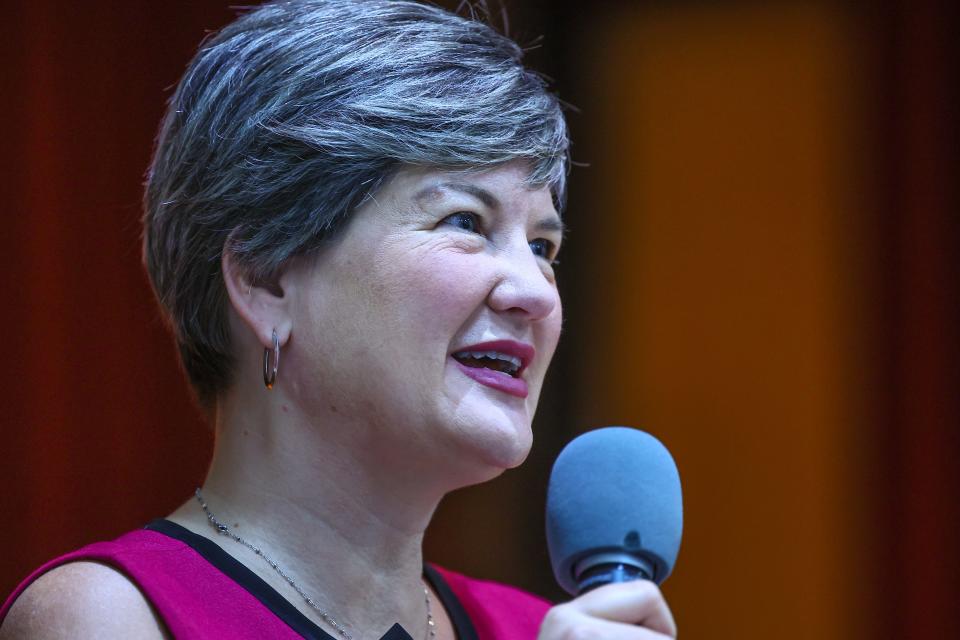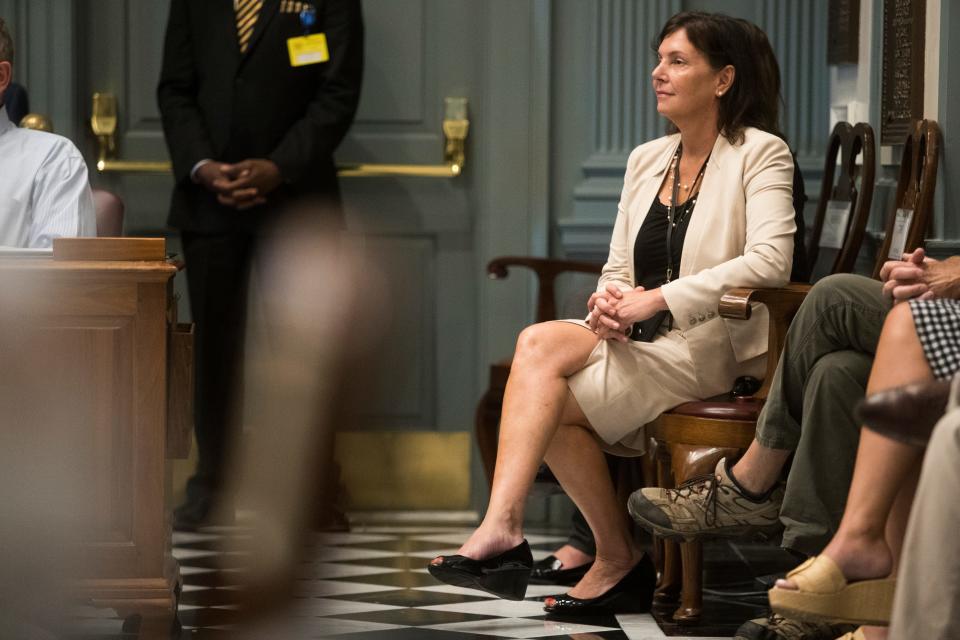A renewed, bipartisan effort to create Delaware government inspector general watchdog
There’s a renewed, bipartisan effort to create a public watchdog armed with subpoena power to investigate fraud and corruption in state government.
On Tuesday, Delaware lawmakers introduced proposed legislation in its latest effort to create a nonpartisan Office of the Inspector General.
The office would be tasked with undertaking investigations, issuing public opinions and initiating civil proceedings against state officials accused of unethical behavior. Officials in the office would have subpoena power to compel telling documents from the targets of its investigations and be empowered to initiate their own investigations into both violations of state law, as well as the state employee code of conduct.
State Sen. Laura Sturgeon, D-West Brandywine Hundred, is one of the bill's primary sponsors. She told reporters that it is "incredibly important" that Delawareans have "full faith and confidence" in their government. She noted that Delaware does have oversight entities, like the auditor's office, but none that have full investigative powers with no political aspect to their existence.
She noted that some question whether a state like Delaware, where one party essentially dominates the other, can have "really, really strong transparency and accountability."
"I think we can, but should there be any question, I am more than happy to create an office that is not in any way dependent on party politics," Sturgeon said.
Under the bill, Delaware's secretary of state would convene a nominating panel to produce names for the governor to pick to fill the job upon confirmation by the Delaware Senate.
The head of the office will appointed for five years before the nominating panel could recommend reappointing the inspector or selecting new candidates. High-level state officials will not be allowed to run the office for three years after they leave their state government position.
The office would alert state prosecutors to any violations of the law uncovered in its investigations and publish summary information about its investigations on a public website. It would also take tips from the public.

The aim is to have the office up and running next year if the legislation is approved by the General Assembly.
Old idea, bipartisan support
Delaware is one of 15 states that do not have such an office, supporters said. And the idea is not a new one. Public watchdogs in the state have been clamoring for such a figure for many years.
Two similar bills were filed in 2022, one by a Democratic senator and one by a Republican representative.
The two were similar in that they’d establish an inspector general office, arm the office with subpoena power and task it with investigating possible fraud, waste, abuse and corruption in state government.
But neither of the bills was raised by legislative leadership for a floor vote in either chamber.
Gov. John Carney's position on the proposal is unclear. His office did not respond to a request seeking comment on the legislation.
The new legislation does have sponsors from both sides of the aisle. Republican Sen. Brian Pettyjohn, a sponsor of the bill and the Senate's minority whip, said a "responsible government is an accountable government."
"Having an official and agency free from electoral politics to help keep the government in check is necessary and long overdue," Pettyjohn, R-Georgetown, said in a written statement.
Recent: Delaware Republicans want to make lawmakers more accountable and increase transparency
Meanwhile, Republican legislators have put forth their own slate of state government watchdog measures. Those include rules against state lawmakers creating a conflict of interest by accepting a paycheck from nonprofits that they are responsible for funding through state coffers, as well as creating an office of ethics within, but independent of, the General Assembly.
Holes in transparency, accountability
Advocates have long argued that arming a nonpartisan, independent watchdog with subpoena power will fill a need in the state. Currently, as it relates to digging for corruption in government there are not many shovels and the state bureaucracy makes the ground hard.
Public records law gives state agencies wide latitude to hide telling receipts of their work: things like emails, police reports and other records. What records that are made available can also be expensive to receive.
The press corps in Delaware has also been diminished in recent decades with few outlets set up to ask adversarial questions of the state's power structure and pay the high legal cost to fight for transparency within the state's public records laws.
Litigation also sometimes reveals dirt within state government, though it is usually only through the context of an individual litigant seeking a payout from the state and rarely, if ever, becomes a larger inquiry into the work of state officials. Records relevant to those cases are also often hidden through wide-ranging and court-approved protective orders.
Additionally, the state's Public Integrity Commission largely exists to give advisory opinions at the request of state bureaucrats. The commission also is the keeper of legislators’ financial disclosure forms, but it does not provide oversight or scrutiny of those disclosures. The inspector general proposal would have ethics oversight over legislators.
And so, the primary watchdog is the Office of Civil Rights and Public Trust within the Delaware Department of Justice.
That office has a handful of attorneys and a few investigators tasked with, among many other things, policing public officials. But their office is small, largely complaint-driven and has other tasks to handle including prosecuting civil rights violations and investigating police uses of force.
In recent years, they’ve brought cases against public officials fudging paperwork, police officers abusing their authority as well as perhaps the most prominent prosecution in Delaware's recent history: former Auditor Kathy McGuiness.

In 2022, McGuiness became the first sitting, statewide public office holder to be convicted of criminal charges when a jury found her guilty of conflict of interest and official misconduct, two misdemeanors, tied to her hiring her daughter as a part-time employee in the auditor’s office. A third guilty verdict based on state purchasing rules was tossed by the trial judge after the proceeding, and she was acquitted of a felony theft charge tied to her daughter’s employment as well as felony witness intimidation.
Late last month, the state's Supreme Court also invalidated her official misconduct charge, leaving the misdemeanor conviction for conflict of interest, the charge pertaining to hiring her daughter, as the only one that has stuck.
Pointing fingers: Convicted Delaware Auditor Kathy McGuiness refusing calls to resign
In the public relations battle that followed her conviction and preempted her election defeat months after, she argued that prosecutors had unfairly picked on her by filing criminal charges when members of the Delaware General Assembly have also been in power when their children have been hired to work under them.
Prosecutors have argued that the circumstances of lawmakers' children becoming employed under their parents was different than McGuiness' situation.
Contact Xerxes Wilson at (302) 324-2787 or xwilson@delawareonline.com.
This article originally appeared on Delaware News Journal: A renewed effort to create Delaware government inspector general

